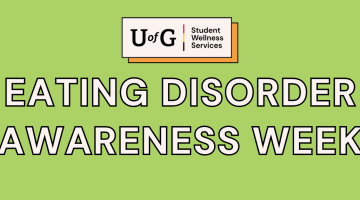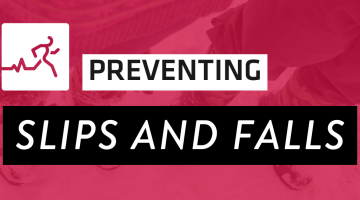Feeling Comfortable in Your Body

During the summer is the most common time for us to become more aware of our bodies, and what we like and don't like about them, but being comfortable with who we are and how we look can be a goal at any time of year. If you are wanting to start feeling more comfortable in your body, check out our tips and resources below.
- Returning Home from University
- Summer Bodies and Their Normal Changes
- Resources for Further Support and Learning
Returning Home from University
Going Home Can Be Hard
-
Going away to university is a large adjustment, but what many folks forget about is the readjustment back home.
-
Pressure from university and fears of weight gain from harmful ideals like the 'freshman 15' can create new insecurities which can manifest into disordered eating practices.
-
Some students find coming home beneficial in this case, but others may find new difficulties with their disordered eating practices.
Why is Going Home Difficult
-
When attending university, some folks can avoid the weight of their parents' expectations. This creates a sense of calm as they settle into their own freedom and independence.
-
In this case, coming back home can be a difficult transition as the independence and freedom one experienced at university decreases.
-
Therefore, going home for the summer can cause anxiety, stress, and worsen some disordered eating behaviours.
Coping With Being at Home
-
Developing healthy coping skills is essential to sustaining one’s mental and physical health, especially during seasons of change or less than ideal living situations
Coping Tips
Have a Conversation with Family
- Learning how to set healthy boundaries and develop effective communication skills are important for any relationship and is critical for protecting one's well-being.
- Having a conversation with family members once you’re home from university may be beneficial to let your family, know where you're mentally and emotionally. This could also mean setting boundaries with them for your well-being as well.
Focus on Your Personal Relationships
-
Making sure you prioritize spending time with your family and friends that make you feel happy and great about yourself is also a beneficial coping strategy!
-
If you feel like you may need additional supports, reaching out to support groups, organizations or counsellors can always be a beneficial way to help cope with transitions.
Build a sustainable routine
-
Many students, regardless of their life at home, struggle to recreate a healthy routine during the flexible of summer months.
-
If you find yourself struggling with disordered eating habits, having a routine during the summer can be an important part of maintaining a balanced lifestyle.
-
Making a routine that incorporates self-care, nutritious meals, moving your body, time outside and doing fun activities that do not focus on your appearance with the people you care about is a great way to start!
Summer Bodies and Their Normal Changes
A ‘Summer Body’ Doesn’t Exist
-
There is no such thing as a ‘Summer Body’ we all just have a body!
-
This 'Summer body' ideal that has formed in the media has put pressure on folks to obtain a 'perfect body' in order to have a good summer
-
During the summer our bodies go through normal changes (like gaining or losing weight, sweating, chaffing etc.) and that's okay!!
-
Here are some tips from us on how to feel comfortable in your body this summer!
Tips for Feeling Comfortable with Your Body’s Changes
Normalizing Very Common Things That Happen to Our Bodies
-
Chaffing and sweating happens to people no matter their shape or size! These are things folks are often embarrassed/self-conscious about, but these are completely normal!
-
Yeast infections are another thing folks are often embarrassed of but it is so common especially in the summer! Yeast is an organism that thrives in a warm, damp environment (like damp bathing suits) - which is why we see more infections in the summer
Practice Body Acceptance
-
Practicing body acceptance can help us be more comfortable in our body changes during the summer. This can be through practicing body positivity or body neutrality.
-
Body Positivity focuses on celebrating and loving our bodies. This is an enthusiastic movement that is aimed to uplift people of body types and appearances.
-
Body neutrality promotes the idea that even when we dislike our bodies, we will still treat them respectfully. We also appreciate what they do for us rather than what they look like.
-
Embracing gratitude practices and thanking your body for all it does is a great way to accept your body.
-
Saying phrases like: “I am thankful for my eyes that help me see the world,” or, “I appreciate my hands that allow me to pet my dog.”
-
It's important to avoid engaging in negative self-talk or mean phrases toward our bodies.
Protect and Care for Your Body
-
It's important to take care of and protect your body especially during the summer. Wearing sunscreen, hats and sunglasses all protect parts of your body from the sun's harmful rays.
-
Make sure you are taking care of your body on the inside as well. This can include drinking enough water to stay hydrated in the heat or eating nutritious meals that will give you energy throughout the day.
Wear Clothes You Want to Wear
-
Wear clothes that make you feel comfortable. Dressing our bodies in ways that make us feel secure and comfortable can help boost our self-esteem.
-
Wear what makes you feel comfy, but also don’t be afraid to go out of your comfort zone. Challenge yourself to wear that bathing suit you’ve been dying to buy or that top in the bright colors you wouldn’t usually wear.
Remember There is No ‘Perfect Body’
-
Like we mentioned before, there is no such thing as a 'Perfect Summer Body' we all just have a body!
-
Don't let your concerns about how your body will look, how it has changed, or how it's perceived stop you from wearing what you want, or doing those fun activities with your friends!



